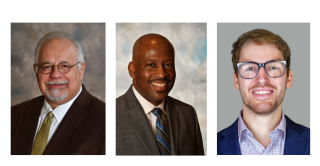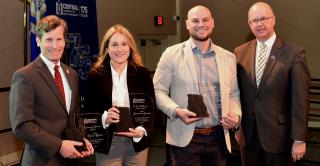
A Marriage and Family Therapist is a helping professional who is trained to intervene in human problems in a holistic way. A Marriage and Family Therapist (i.e., "MFT") is trained in various forms of theories and methods stemming from a model of understanding human interaction called SYSTEMS THEORY. Systems theory is an integrated set of concepts which describes how each person is interconnected with his or her context in very complex ways, and looks at the individual as simultaneously a whole entity and as part of a larger system. Systems theory holds that individuals function in relation to others and in relation to a set of circumstances that dictate how each person is to react. Conversely, the individual is also seen as being capable of having powerful input into how the larger system operates and can have an influence in changing his or her environment.
Since each person in a system has a unique perspective and role in the system's operation, there are "multiple realities" that exist in a family or other social unit that an MFT must identify and work with to assist the members in understanding themselves in new ways. The MFT identifies dysfunctional processes, structures, sequences, and beliefs in the family or system that maintain problems, symptoms, and constraints that keep individuals from developing their potentials. Once having assessed how the system operates and understands the relationship between the presenting symptom and the system's operation, the MFT designs interventions aimed at altering dysfunctional structures or processes and assisting the system in developing new realities and competencies that permit growth and individuation of its members without the presence of symptoms.
Therapies based on systems theory often involve entire families or groups, but can involve individuals alone, couples, or entire networks of individuals who are interconnected in some way. Regardless of the unit of treatment, the MFT operates on the interconnections between the individuals and attempts to alter or "restructure" how systems function in order to permit the individuals that comprise such systems to realize their fullest potentials. MFTs are taught not only techniques and theories of individual counseling, but also how to assess and treat larger social structures. MFTs are trained in understanding complex relationships, and as such, are capable of intervening with non-family organizations, including work groups, schools, medical settings, neighborhood organizations, political groups, etc.
MFTs often work with other human service professionals to ensure that both dysfunctional aspects of the system and strengths are appropriately assessed and addressed. The MFT professional must have competence in case management procedures, including referral skills, coordination skills, and communication skills. Marriage and Family Therapy is an active approach toward intervention, and often requires that the MFT extend his or her work outside the boundaries of the consultation room during the Clinical Hour. Such activities as home visits, conferences with teachers, visits to the probation department, coordination of treatment planning meetings with other professionals involved with a case, and many other tasks are often part and parcel of the work of the MFT. Such is in keeping with the principles of systems theory and the understanding of the complex interrelationships among parts of a system.




.png)